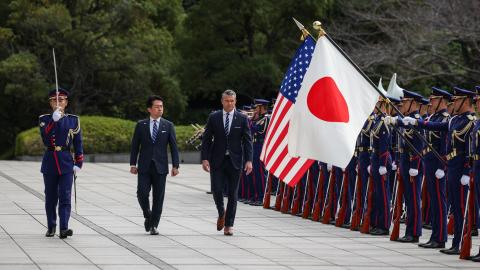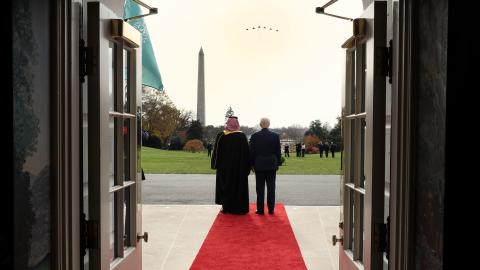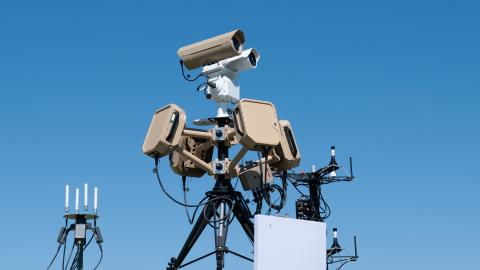Last week, the U.S. Court of Appeals for the 9th Circuit upheld a nationwide temporary injunction on President Trump's executive order relating to refugees and visas from seven Muslim-majority countries. The White House says it will not take the case to the Supreme Court, but is rather drafting a version of the executive order that administration officials believe will get past the courts. Perhaps. The unhappy reality is that the 9th Circuit Court's decision and much of the debate surrounding the executive order partake not of logic and reason but rather issue from a form of politicized hysteria and judicial arrogance.
The 9th Circuit Court argued that "The Government has pointed to no evidence that any alien from any of the countries [Iran, Iraq, Libya, Somalia, Sudan, Syria, Yemen] named in the Order has perpetrated a terrorist attack in the United States."
The language is precise but the intention is false. "Alien" refers to an individual who is not a U.S. citizen, or U.S. national, or permanent resident alien, also known as a green-card holder. In 2011, two Iraqi nationals admitted as refugees, i.e. "aliens," affiliated with al Qaeda and who fought against U.S. troops in Iraq, were arrested in Bowling Green, Kentucky for plotting terrorist attacks in the United States, but did not manage to "perpetrate" one.
U.S dual-nationals, not aliens, from the seven states, as well as permanent resident aliens, have been involved in successful terrorist attacks and plots against the United States. Among others:
Abdul Razak Artan, a Somali refugee, and permanent resident alien, used his car and a knife to attack fellow students at the Ohio State University in December, 2016 before he was shot to death by police.
Anwar al-Awlaki was an American-born dual national with Yemeni citizenship who, according to Michael Leiter, former director of the National Counterterrorism Center, had a "direct operational role" in the "underwear bomber" plot against a Detroit-bound plane with 289 passengers aboard. Awlaki may also have played a part in the Fort Hood attack, which left 13 dead, and another 30 wounded. Awlaki was killed in a 2011 drone attack ordered by President Barack Obama.
Mansour Arbabsiar, a naturalized American citizen who was also an Iranian national, plotted together with the Islamic Revolutionary Guards Corps to kill the Saudi ambassador to the United States in a Washington, D.C. restaurant. The operation would have likely resulted in mass casualties in the nation's capital. In September 2013, Arbabsiar was sentenced to 25 years in prison.
It's clear that nationals from the seven countries have waged, supported, or plotted terrorist attacks on American soil, but the point of the executive order isn't to punish for past incidents, or else Saudi Arabia, for instance, would be included on the list due to the number of Saudi nationals involved in the 9/11 attacks. The point rather is to protect against future attacks. The reason those seven countries are listed is because they are either state sponsors of terror (Iran, Sudan, Syria), or have dysfunctional central governments or none at all (Iraq, Libya, Somalia, Yemen), which make it more difficult to vet visa applicants with their home country.
Moreover, the United States has been involved in some form of armed conflict in all seven of these states over the last several years, which may put American interests in the crosshairs of various actors within these states, or of the states themselves.
Let's widen the focus some. As I say, the purpose of the executive order is not to punish but to prevent future attacks in the United States. To show that the executive order is a bad mistake, the burden is on those who mean to show there is no evidence that nationals from the seven states have perpetrated acts of terror anywhere—like, for instance, in Europe.
German authorities have stopped a number of terrorist attacks plotted by Syrian refugees affiliated with ISIS, including an attack on a major transportation hub. In July 2016, a Syrian refugee killed a woman with a machete near Stuttgart. The same month, a Syrian asylum seeker blew himself up at a musical festival, injuring 15 people.
Clearly the vast majority of Muslim refugees mean to escape violence, not carry it with them to Europe. But ISIS has used the refugee crisis to disguise their operators and seed European networks. According to a Washington Post report from April 2016, "over the past six months, more than three dozen suspected militants who impersonated migrants have been arrested or died while planning or carrying out acts of terrorism." Most notorious among them were members of the cell that waged multiple terrorist attacks in Paris in November 2015 that killed 137 and injured nearly 400. This, including an attack on the Bataclan music hall that killed 90, was only the most dramatic and violent of ISIS-inspired or ISIS-directed operations that have taken place in Europe since 2014. These include the Charlie Hebdo and Hyper Cacher attacks that killed 17, and the truck attack in Nice in July 2016 that killed 86 people, including 10 children, and injured 434.
And it's not just ISIS that's sending murderers to Europe among the refugees. Militiamen from Iranian-backed Iraqi Shia groups have relocated to the continent, as have war criminals who fought on behalf of Syrian despot Bashar al-Assad. Indeed, Iraq, Syria, and Iran have a long history of exploiting terror networks in Europe, especially in France. In other words, the problem is not simply that some bad people among the migrants are targeting Europe for terror attacks, but that Middle Eastern states are likely to infiltrate the refugee stream with operatives. Thus, states will not only continue their regional conflict with Europeans in the crossfire, but will also be able to shape European policy through blackmail. If you don't want your charming cities blown up, and your citizens' blood spilled in the streets, you better do as we say.
Was it a good idea for Europe to open its doors so widely to the problems that have turned the Middle East into a nightmare? Is Europe a better, more diverse place for admitting the sociopathic murderers who fought to defend Assad? What is the upside of importing the region's issues, its wars and bloody conflicts? America has some portion of that experience. As former FBI director Robert Mueller told Congress in 2011 that among areas of "threat within the United States … relates to individuals going to Somalia to fight with al Shabab." Indeed there's a pipeline from Minnesota to Mogadishu that feeds the ranks of al Shabab, an al Qaeda affiliate, and now, NPR reported, ISIS.
There is no doubt that like the Somali community in Minnesota, the vast majority of Syrian asylum seekers, and visa applicants from the seven states listed, are decent and peaceful people who just want a chance to live, prosper, and raise their families outside a war zone. But the reason that America's experience of the refugee crisis is different from Europe's to date is largely because compared to the estimated one million-plus Syrian refugees now seeking asylum in Europe, America has received only a small fraction.
Since the Syrian conflict began in 2011, the United States has admitted around 15,000 refugees—a little more than 2,000 until 2016, when the Obama administration opened the doors to 12,500 Syrian refugees. Given the small number of refugees the United States has admitted as compared to how many Europe has, the burden of proof is on those seeking to show that Europe's experience is irrelevant to American national security.
Why wouldn't the odds of ISIS members or Assad militiamen sneaking into the United States increase as the number of refugees increases? The screening process is deeply flawed. As one former Obama administration official working on the refugee vetting process told the Washington Post, it's difficult to "determine something as basic as an applicant's criminal history." He continued: "We do the best with what we have… We talk to people about what their criminal histories are, and we hear about that. That's pretty much where we are."
That was in 2015. But in the last two years the vetting process has been fixed and all the holes patched—that's what various experts and officials opposed to Trump's executive order seem to be arguing. "The executive order reads," one former U.S. official told Mother Jones, "as if the stringent measures that have been put in place over the past 15 years to screen refugees don't exist."
The time span of fifteen years is meant to point back to 9/11, but the reality is that while they are better now, there are still dangerous problems, noted by lawmakers and law enforcement officials, as recently as December. After the Ohio State attack, chairman of the Senate Judiciary Committee, Sen. Charles Grassley wrote to the Department of Homeland Security that the assailant's family should have been vetted more carefully before they were granted refugee status.
After the Bowling Green case, U.S. officials admitted to problems with a screening process that let through two Iraqi terrorists. "This case demonstrates specific gaps that were present in the screening process that was in place in the beginning of the [Obama] administration," one Department of Homeland Security Official told ABC News. "Once the administration became aware of these gaps, it took immediate steps to fill them. Today our vetting process considers a far broader range of information than it did in past years."
It's unfair to demand perfection from the agencies that protect American citizens, but they realize better than anyone that the vetting process is worse than imperfect. As FBI director James Comey told Congress in November 2015, "a number of people who were of serious concern" slipped through the screening of Iraq War refugees, including the two arrested on terrorism-related charges. "There's no doubt," said Comey, "that was the product of a less than excellent vetting."
The Iraqis were caught because their fingerprints matched those collected by American troops in Iraq. The United States doesn't have those capabilities in, say, Syria or Iran, nor do we have a relationship with the security services of those two State Department-designated state sponsors of terror that would allow American agencies to rely on the information they might provide. According to Comey, it's not going to get much better regarding Syrian refugees. "If we don't know much about somebody, there won't be anything in our data," the FBI director told Congress. "I can't sit here and offer anybody an absolute assurance that there's no risk associated with this."
That's an honest assessment from an honorable public servant. Unfortunately, much of the expert commentary of late is not. Consider, for instance, why many terrorism experts and former officials argue that the executive order won't help protect Americans at home. Some specialists, like Jessica Stern, tell us that in fact the executive order is "likely to make us less safe." The EO, said Paul Pillar, a former official at the CIA's Counterterrorism Center, "is not targeted at where the threat is, and the anti-Islam message that it sends is more likely to make America less safe." How does it make America less safe? Former CIA analyst Nada Bakos explains that, "All it does is help [Islamic State] recruiting." Yes, agrees ex-FBI agent Ali Soufan, "ISIS members and ISIS leaders, at least in their propaganda, have been calling President Trump and his ban and his recent policies a godsend."
That those experts and former officials opposed to the executive order contend that suspending visas to Syrian refugees indefinitely and temporarily suspending issuing visas to nationals from seven states will turn some Muslims into terrorists seems to me counterproductive reasoning, to say the least. There are only two logical conclusions to be drawn from this argument—either the United States should impose a permanent and total ban of Muslims until the region stops producing quantities of young men who will kill others if they don't get their way; or ISIS is entitled to a say in drafting America's national security and policies.
Both are absurd, and the latter is suicidal. For instance, Hezbollah and Hamas both have narratives, too, with Israel at the center of their paranoid and gruesome worldviews. Should the United States stiff-arm Israel so as not to play into the Hezbollah and Hamas narrative? What happens in the aftermath of a terror attack on America? Should we then tailor our policies to suit the demands of terrorists lest they strike again? How about if ISIS won't stop killing Americans until America admits numbers of refugees that are acceptable to ISIS?
You don't get it, say the experts. We're not trying to appease terrorists; we're making war on them and Trump's executive order is making it harder for us to work with regional partners, like the Iraqis. Fine, let the Iraqis throw out American troops. If the central government in Baghdad thinks it can tackle ISIS on its own, without American arms, training, special operations and air support, then we should pack up and go home. But they can't, which is why it would be self-defeating to stop working with the United States.
The United States is campaigning against ISIS in order to assist states either incapable of doing it themselves, or unwilling to. Further, it keeps the organization on the defensive in the region so that it doesn't wage attacks here at home. So, let's suppose that Trump has every intention of keeping his promise to wage a massive campaign against ISIS. In response, ISIS will do everything it can to stop that operation, and take revenge, by attacking targets in the American homeland. Will ISIS try to sneak its operatives into the refugee stream? Have they done so already? The answer to both questions, based on the group's behavior in Europe, is very likely. A Bataclan-like assault will be the least of it. Trump would be criminally irresponsible if he didn't do everything in his power to reduce the chances of that effort being successful.
Barack Obama fought ISIS, albeit half-heartedly, for similar reasons. The fact that ISIS has turned a large swath of the Syrian desert into a caliphate is a tragedy for many Syrians and Iraqis, but has little bearing on American interests. However, he understood that a major ISIS attack on the United States would prove catastrophic for a presidency. Al Qaeda's September 11, 2001 attacks consumed George W. Bush's two terms in office, during which he waged two inconclusive wars in the Middle East. Obama didn't want the same, and to cover as many bases as possible, he also kept out Syrian refugees, until 2016 when they were just about to become someone else's problem.
It can hardly come as a surprise that Trump also wants to avoid a major terrorist attack on his watch, which happens to fit neatly with the description of the job the American public hired him for—to keep Americans safe. Thus the White House has reason to believe it can draft policies intended to protect the welfare of American citizens. Trump was elected to the presidency, and the courts were not. The idea that politically appointed judges are licensed and qualified to make decisions that have both national security and political implications is preposterous, without precedent in American law and practice, and dangerous.
Americans are entitled to an honest debate about immigration, the executive order, Syrian refugees, and how we might best balance our national security interests with humanitarian concern for the welfare of others as well as our wish to make our society better and stronger by welcoming those from around the world who share our most fundamental convictions as Americans. Would, for instance, those Syrian immigrants in flight from a mass murderer, and driven by industry, love of family, and love of their new country, make America a finer country? Do those Somali families whose sons go to Africa to wage war on behalf of an al Qaeda affiliate before returning to the Midwest make us a better nation?
We're owed that debate. We voted for that much at least. The courts have no legal right, no prerogative to take it from us.
















